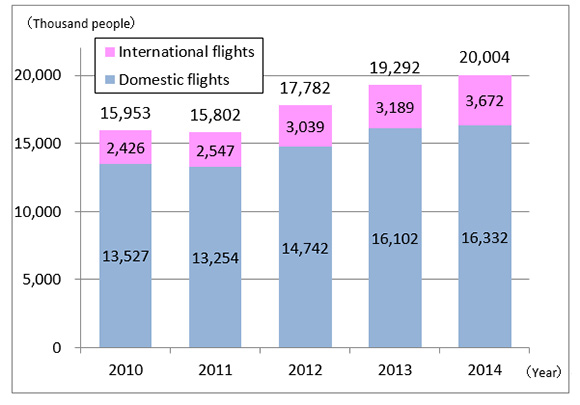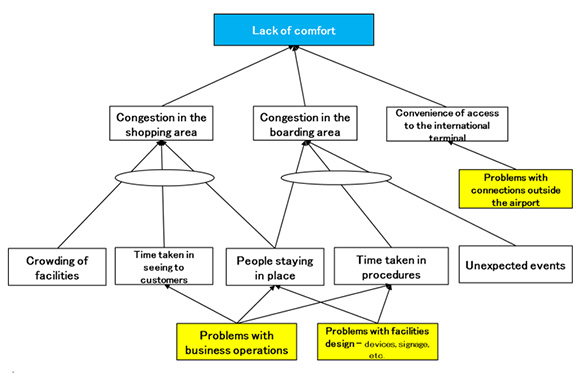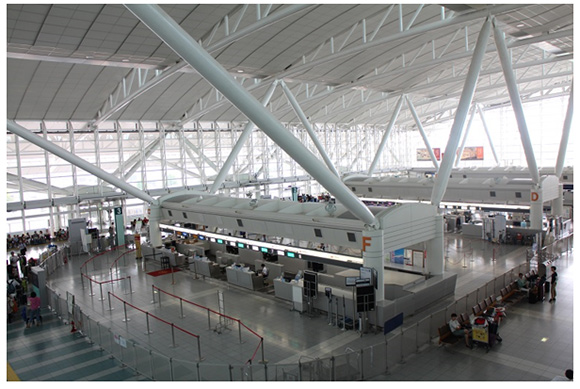Archived content
NOTE: this is an archived page and the content is likely to be out of date.
Kyushu University, Fukuoka Airport, and Fujitsu Commence Field Trials Aimed at Raising Passenger Satisfaction
Solving issues concerning places where people gather by using the mathematical technologies of the Fujitsu Social Mathematics Joint Research Unit
Kyushu University,Fukuoka Airport Building Co., Ltd.,Fujitsu Laboratories Ltd.
-
[1] Fujitsu Social Mathematics Joint Research Unit
A mathematical technology research and development unit aimed at resolving social issues, established in September, 2014, as part of the Institute of Mathematics for Industry by Kyushu University, Fujitsu Limited and Fujitsu Laboratories Ltd.
-
[2] Institute of Mathematics for Industry
Asia's first mathematics research center focused on industrial technology. In addition to carrying out mathematical theory research for industry, it also contains the Laboratory of Advanced Software in Mathematics, which implements and publishes theories as software.
About Fujitsu
Fujitsu is the leading Japanese information and communication technology (ICT) company, offering a full range of technology products, solutions, and services. Approximately 159,000 Fujitsu people support customers in more than 100 countries. We use our experience and the power of ICT to shape the future of society with our customers. Fujitsu Limited (TSE: 6702) reported consolidated revenues of 4.8 trillion yen (US$40 billion) for the fiscal year ended March 31, 2015. For more information, please see http://www.fujitsu.com.
About Kyushu University
Since its foundation in 1911, Kyushu University has become one of the leading universities in Japan. The University is comprised of 11 undergraduate schools, 18 graduate schools, 17 faculties, 5 research institutes, a University hospital, and a University library, as well as over 50 affiliated research centers. Empowered by our 100-years of tradition and experience, we are keen and ready to tackle whatever challenges we must face. For more information, please see: http://www.kyushu-u.ac.jp/english/index.php.
About Fukuoka Airport Building Co., Ltd.
Fukuoka Airport Building Co., Ltd. was established in April 1967 by the City and Prefecture of Fukuoka, the business community of Kyushu and airline companies, commissioned to construct and operate the terminal buildings at Fukuoka Airport. Ever since, we have undertaken the construction, expansion and renovation of the terminal buildings and enhanced the facilities to meet the increasing aviation demands during the high economic growth period. In recent years, a new international passenger terminal and an international cargo terminal were completed in May 1999, and the former international terminal was renovated exclusively for domestic flights, having started operation as Terminal 3 building in July 2000. For more information, please see: http://www.fuk-ab.co.jp/english/.
About Fujitsu Laboratories
Founded in 1968 as a wholly owned subsidiary of Fujitsu Limited, Fujitsu Laboratories Ltd. is one of the premier research centers in the world. With a global network of laboratories in Japan, China, the United States and Europe, the organization conducts a wide range of basic and applied research in the areas of Next-generation Services, Computer Servers, Networks, Electronic Devices and Advanced Materials. For more information, please see: http://www.fujitsu.com/jp/group/labs/en/.
Press Contacts
Institute of Mathematics for Industry
![]() Phone: 092-802-4402
Phone: 092-802-4402
![]() E-mail: jimu@math.kyushu-u.ac.jp
E-mail: jimu@math.kyushu-u.ac.jp
Company:Kyushu University
Press Contacts
Community & Public Relations Department
![]() Phone: 092-623-0611
Phone: 092-623-0611
![]() E-mail: webmaster@fuk-ab.co.jp
E-mail: webmaster@fuk-ab.co.jp
Company:Fukuoka Airport Building Co., Ltd.
Technical Contacts
Knowledge Information Processing Laboratory
![]() Phone: 044-754-2652 (direct line)
Phone: 044-754-2652 (direct line)
![]() E-mail: fsmjru@ml.labs.fujitsu.com
E-mail: fsmjru@ml.labs.fujitsu.com
Company:Fujitsu Laboratories Ltd.
All company or product names mentioned herein are trademarks or registered trademarks of their respective owners. Information provided in this press release is accurate at time of publication and is subject to change without advance notice.
Date: 10 September, 2015
City: Fukuoka and Kawasaki, Japan
Company:
Kyushu University / Fukuoka Airport Building Co., Ltd. / Fujitsu Laboratories Ltd.


